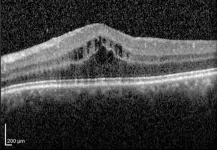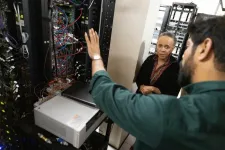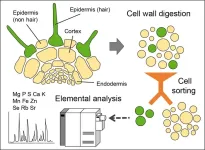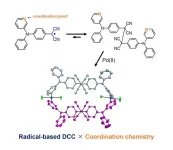The benefits of Anti-CD69 antibodies for future cancer therapies
Scientists from Japan identify CD69, a glycoprotein present on specific immune cells, as a new target for cancer immunotherapy
2023-06-13
(Press-News.org)
CD8+ T cells, a vital component of the immune system that provides immunity against cancer, have been the focal point of anti-cancer therapies. Recent studies have identified two major subpopulations of these cells present within the tumor—the stem-like cells that do not have anti-tumor activity, and the terminally differentiated CD8+ T cells, which are generated from the stem-like cells and have cytotoxic function on tumor cells. Tumor-draining lymph nodes (TDLNs) have been found to be the primary site for the presence of these cells. However, the molecular mechanisms responsible for the generation of stem-like cells into terminally differentiated CD8+ T cells are yet to be understood.
Further, scientific studies on mice have given a glimpse into the involvement of CD69, a transmembrane functional glycoprotein often expressed on CD8+ T cells in the tumor microenvironment and the TDLNs, in anti-tumor immunity. However, the complete molecular mechanism of its involvement is not fully understood. Thus, to explore the molecular role of CD69 in anti-tumor immune responses, a team of scientists from the Graduate School of Medicine at Chiba University, Japan, carried out a study that was published on May 22, 2023, in Cancer Immunology Research, a journal of the American Association for Cancer Research. The first author of this study is Senior Lecturer Ryo Koyama-Nasu, and the team included Dr. Motoko Y. Kimura and Dr. Toshinori Nakayama of Chiba University.
To understand the relevance of CD69-targeting in boosting anti-tumor responses, the scientists used different strains of mice as tumor models in their study, including mice that do not express the CD69 molecule, i.e., CD69-deficient mice. They also evaluated the response of mice after the administration of an anti-CD69 antibody, an immune molecule that selectively binds to CD69 to inhibit its function.
Using single-cell transcriptomics, the scientists found that CD69 is a critical component that regulates the differentiation of CD8+ T cells present within TDLNs. They further observed that the deficiency of CD69 results in a reduced expression of a transcription factor, TOX—a molecule that reduces anti-tumor activity at the level of RNA regulation. Dr. Koyama-Nasu explains, “CD69 deficiency resulted in reduced expression of the transcription factor TOX in tumor-specific CD8+ T cells in TDLNs, promoting differentiation of stem-like CD8+ T cells into the functional terminally differentiated CD8+ T cells in TDLNs.”
This is a significant finding, because it explains how CD69 regulates the generation of tumor-specific CD8+ T cells in TDLNs. The team further noted that CD69-deficient mice showed increased production of terminally differentiated CD8+ T cells in the tumor microenvironment, which led to enhanced anti-tumor activity.
In this regard, Dr. Kimura, the corresponding author of the study, adds, “We observed that the use of the immune checkpoint inhibitor anti-PD-1 improves the efficiency of anti-CD69 treatment by increasing the number of available stem-like CD8+ T cells, thus making this combination-therapy effective even in the case of immunorefractory melanoma.” Moreover, CD69 deficiency or anti-CD69 treatment did not have any negative impact on the health of mice, indicating that the absence of CD69 would not negatively affect cellular functioning.
The scientists conclude that the frequent expression of CD69 on the surface of CD8+ T cells in TDLNs in human cancers makes it a novel therapeutic target for immunotherapies. Potential clinical evaluations of humanized monoclonal antibodies that recognize human CD69 could provide a new and promising strategy for future cancer immunotherapies.
About Dr. Ryo Koyama-Nasu
Dr. Ryo Koyama-Nasu has been working as a Senior Lecturer since 2021 in the Department of Experimental Immunology at the Graduate School of Medicine at Chiba University, Japan. He has 30 publications on various oncology topics in reputable peer-reviewed journals.
END
[Attachments] See images for this press release:
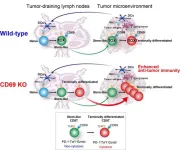
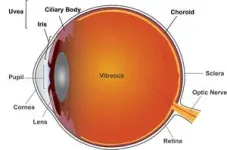
ELSE PRESS RELEASES FROM THIS DATE:
2023-06-13
Repeat treatment with corticosteroid injections improved vision in people with persistent or recurrent uveitis-related macular edema better than two other therapies, according to results from a clinical trial funded by the National Eye Institute (NEI). Compared with methotrexate or ranibizumab intravitreal (in-the-eye) injections, the corticosteroid treatment achieved greater reductions in retinal swelling and was the only therapy in the study that improved vision. The report was published today in the journal Ophthalmology. NEI is part of the National Institutes of Health.
“Prior to this study, we didn’t know the best treatment for persistent or recurrent macular edema, a major ...
2023-06-13
BINGHAMTON, N.Y. -- In collaboration with the Thurgood Marshall College Fund, Binghamton University has announced a New Educational and Research Alliance (New ERA) with six historically Black colleges and universities (HBCUs): Alabama A&M University, Central State University, Tuskegee University, Prairie-View A&M University, the University of the District of Columbia and Virginia State University.
The groundbreaking partnership is built on the shared missions of education, research and service, aiming to foster holistic, equitable and sustainable collaborations that will shape the future of academia and beyond.
The strategic alliances formed through this partnership will ...
2023-06-13
How do you study the effects of exposure to per- and polyfluoroalkyl substances (PFAS), when it is in everything?! To study the effect of a chemical, toxicologists typically expose animals to various doses of the chemical over a period of time so that they could then study the dose versus effect relationship. Such toxicology studies often employee several types of “blanks” for quality control. Blanks are experiments where the test animals are not given any dose of the chemical being studied (sort of like a placebo in human drug ...
2023-06-13
Tulsa, Okla. – A pioneering study conducted by researchers at the Laureate Institute for Brain Research (LIBR) in Tulsa, Okla., has made significant strides in understanding the elusive gut-brain connection, a complex relationship that has long puzzled scientists due to the difficulty of accessing the body's interior. The study, “Parieto-occipital ERP indicators of gut mechanosensation in humans,” appears in the peer-reviewed scientific journal Nature Communications.
The research team successfully had ...
2023-06-13
Plant roots play a critical role in taking up, selecting, enriching and retaining a range of different mineral elements thereby supplying distant plant tissues with nutrients while sequestering excessive amounts of metals. To execute such element-specific functions, a range of ion transporters present at roots mediate the uptake, efflux and intracellular compartmentalization of different mineral elements. Most ion transporters show characteristic tissue and cell type-specific localization patterns, which can be altered in response to internal signalling or external cues. To fully ...
2023-06-13
A groundbreaking machine-learning study has unmasked the best drug combinations to prevent COVID-19 from coming back after an initial infection. It turns out these combos are not the same for every patient.
Using real-world data from a hospital in China, the UC Riverside-led study found that individual characteristics, including age, weight, and additional illness determine which drug combinations most effectively reduce recurrence rates. This finding has been published in the journal Frontiers in Artificial Intelligence.
That the data came from China is significant for two reasons. First, when patients are treated for COVID-19 in the U.S, it is ...
2023-06-13
In situ bioprinting, which involves 3D printing biocompatible structures and tissues directly within the body, has seen steady progress over the past few years. In a recent study, a team of researchers developed a handheld bioprinter that addresses key limitations of previous designs, i.e., the ability to print multiple materials and control the physicochemical properties of printed tissues. This device will pave the way for a wide variety of applications in regenerative medicine, drug development and testing, and custom orthotics and prosthetics.
The emergence of regenerative medicine has resulted ...
2023-06-13
Women suffering from the autoimmune disease multiple sclerosis temporarily get much better when pregnant. Researchers have now identified the beneficial changes naturally occurring in the immune system during pregnancy. The findings, published in Journal of Neuroinflammation, can show the way to new treatments.
Pregnancy is a very special condition from an immunological point of view. The immune system serves to defend us against foreign substances. However, although half of the genetic material of the foetus ...
2023-06-13
People who adhere to global Cancer Prevention Recommendations are putting themselves at lower risk of developing the disease, new research confirms.
Experts at Newcastle University have reviewed evidence of following the 2018 World Cancer Research Fund (WCRF) and American Institute for Cancer Research (AICR) lifestyle-based recommendations.
The findings, published today in Cancer, revealed that adhering to a healthier lifestyle, including maintaining a healthy body weight and eating little red meat and processed meats such as bacon, helps ...
2023-06-13
A research group led by Professor Hideki Fujiwara and Associate Professor Daisuke Sakamaki from the Graduate School of Science at Osaka Metropolitan University succeeded, for the first time, in synthesizing a new molecule using a novel combination of dynamic covalent chemistry, in which organic radicals couple and dissociate reversibly, and coordination chemistry, which binds radicals to metal ligands. The study shows that the two types of reactions work without inhibiting each other.
“This research was based on a very simple idea of combining two types of reactions,” stated Professor Sakamaki. “However, it was not clear ...
LAST 30 PRESS RELEASES:
[Press-News.org] The benefits of Anti-CD69 antibodies for future cancer therapies
Scientists from Japan identify CD69, a glycoprotein present on specific immune cells, as a new target for cancer immunotherapy


